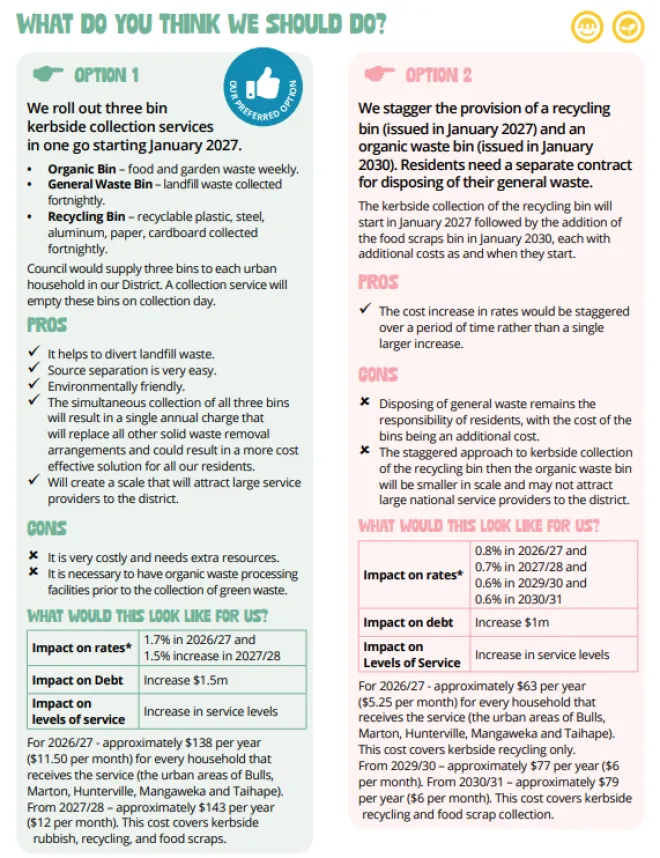Where's it @ Rangitikei - How do you want to roll out kerbside collection requirements?
In 2023 the Ministry for the Environment (MfE) released Te rautaki para - Waste strategy.
Te rautaki para - Waste strategy provides direction for New Zealand waste systems from now to 2050.
The vision of Te rautaki para - Waste strategy is
“By 2050, Aotearoa New Zealand is a low-emissions, low-waste society. Built upon a circular economy. We cherish our inseparable connection with the natural environment and look after the planet’s finite resources with care and responsibility.”
Work has been started to repeal and replace the Waste Minimisation Act 2008 and the Litter Act 1979. It is uncertain whether this will progress under the new government.
If new legislation was adopted, it is expected to support the delivery of significant initiatives including Te rautaki para - Waste strategy and actions relating to waste in the Emissions Reduction Plan.
Kerbside Standardisation
At the beginning of 2023 MfE announced a move to standardise kerbside recycling across the country. This announcement signalled:
- Food scrap collections be available to households in all urban areas.
- A standardised set out of recyclable materials would be collected from households in urban areas.
- Minimum standards for diverting waste from landfill would apply to councils, with reporting requirements for private waste companies.
- Businesses would be required to separate food scraps from general waste by 2030.
What does this mean for us?
Council has to meet the requirements laid out by the Ministry relating to kerbside standardisation. Based on current information, the key implications for Rangitīkei are expected to be:
- All urban areas >1,000 residents have a council run recycling collection (by 2027).
- All urban areas >1,000 must have a food, or food and garden collection (by 2030).
Council is proposing two options:
Option 1 (Our preferred option)
Provide a Council-run collection to the urban households in Bulls, Marton, Hunterville, Mangaweka and Taihape with three bins for: organic waste, general waste and recycling from January 2027.
Option 2
Provide a Council-run collection to the urban households in Bulls, Marton, Hunterville, Mangaweka and Taihape where one bin is issued from 1 January 2027 for recycling and a second bin is provided for organic waste (food and garden waste) from 1 January 2030. Residents will need to have a separate contract for general waste disposal.
Based on current information Rātana and Koitiata are not required to be serviced. Council may provide this service at their discretion.
What do you think we should do?

*Impacts are based on initial estimated costs and may differ from final costs. Any increase would only apply to ratepayers receiving the kerbside collection services. The proposed kerbside collection services would replace the requirement for residents to have their own privately contracted kerbside collection service, which may result in a decrease in cost
